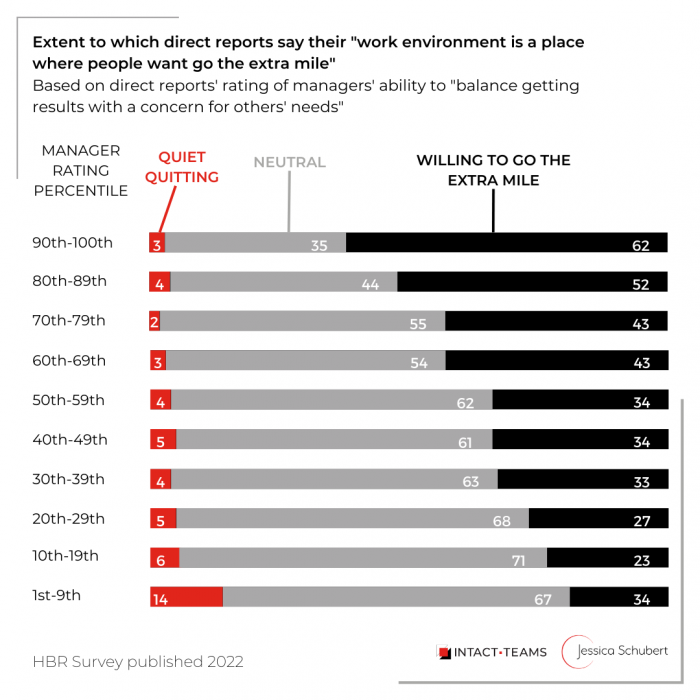I had been tossing up if I should write about this hot topic of ‘quiet quitting’. Is it just a newsworthy headline, or do we have a problem? Turns out, we always had this behaviour in our workforce, but it has newly been coined ‘quiet quitting’. Is quiet quitting about bad employees or bad leadership?
What is ‘quiet quitting’?
This HBR article describes quiet quitting as ‘employees who are only willing to do the minimum work necessary to keep their job’, and Gallup mentions that ‘millions of people in the US are not going above and beyond at work and just meeting their job description’.
Is quiet quitting new?
I chatted with a group of senior leaders at a recent workshop about quiet quitting, and they responded that organisations and teams have always been carrying what they call ‘dead wood’ or ‘quiet quitters’. An old behaviour with a new name.
I found the data from Gallup helpful to get some insights into where quiet quitting comes from as they connect it to employee engagement. Their findings show that whilst the proportion of engaged workers remains at 32%, the proportion of actively disengaged employees has almost doubled since early 2021.
I asked my group of leaders about their thoughts on the root cause of increased quiet quitting. Their answer was synonymous: a lack of engagement with the manager or leader. Their response didn’t surprise me. Employee engagement has been long identified as the biggest driver of growth. The HBR article attests to that as well with their data from a recent survey:

The survey shows a direct correlation between the manager’s ability to build a relationship with their employees where they are not counting the minutes until quitting time and quiet quitting numbers.
I am working with a leader in the consumer goods industry who has been struggling with his team’s performance. Quiet quitting is part of the problem, and after some 360 feedback, it’s evident that the leader has almost completely disengaged themselves from the team. Whilst this is an extreme example of someone not even talking to their team apart from ticking boxes, we see a lack of engagement all too often.
How do we increase engagement?
Empower and trust your employees. Empowerment affects individuals, teams and the organisation. When people feel they are empowered, they take pride in what they do, go that extra mile to achieve goals and are engaged with others.
What empowered work cultures look like:
Trust
When employees are ‘given the power’ to make decisions and held accountable for their actions, it creates trust with the manager and management. People feel their expertise, work and effort are valued. Delegating decisions, especially big ones, require the leader to trust the team member and ‘take a risk’. There is nothing more empowering than being trusted with something meaningful and important.
Productivity
Empowered people work hard to get things done. They feel responsible and have a sense of pride in finishing the job. In fact, a recent Forbes article says that empowered employees are 67% more willing to put in extra effort on the job.
Performance
Empowerment is not just about delivering work; it’s about having a seat at the table, being heard and having responsibility to deliver. A Forbes survey showed that employees who feel their voice is heard are five times more likely to feel empowered to perform their best work.
Collaboration
Empowered employees collaborate more with members of their team as well as across departments. When people feel empowered, they are open to new ideas, seek help and involve others. It’s not hard to see how this fosters team member engagement.
Change
Empowerment enables employees to embrace change. They feel they are part of leading change and an integral part of creating the future. I see this first-hand with many organisations empowering their people to drive digital transformation.
Retention
People who are happy and engaged will stay. Empowering people has a direct impact on high retention rates. People are also more likely to advocate for your company to attract new talent.
Trust and empowerment really are two sides of the same coin. Trust is the foundation for empowerment, and empowerment cultivates trust.
If you have a culture of quiet quitting in your organisation, focus on supporting your team leaders to (re)engage with their team members.
If you want to know how we can support your leaders to stay engaged through coaching or leadership programs, get in touch at jessica@intactteams.com.








